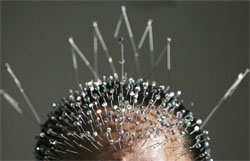
What is acupuncture, and how does it work?
What can acupuncture treat?
What can I expect during my first visit?
What is tongue diagnosis and pulse diagnosis?
The treatment itself
Are the results psychological and/or permanent?
Is it painful?
What is acupuncture, and how does it work?
Acupuncture originated in China approximately 3,500 years ago, and within the last 3 decades has become a popular mode of treatment in the United States.
According to traditional Chinese medicine, there are about 2,000 acupuncture points on the body that are connected by 20 pathways, also known as meridians. These meridians conduct energy between the body and the internal organs. This Energy is called qi (pronounced “chee”). The qi assists in regulating balance in the body. Acupuncture can make the patient feel more energetic, yet more relaxed, and it can alleviate some disease symptoms. At its best, in some cases it may have as good an effect as Western medicines without the side effects. The benefits of acupuncture will depend on factors such as the nature and longevity of the problems being addressed as well as the willingness of the individual to follow through with various aspects of the proposed treatment.
Acupuncture takes a holistic, or whole-picture, approach to healing, and creates a normal flow of qi, which in turn restores health to mind, body, and spirit.
top
What can acupuncture treat?
The National Institute of Health and the World Health Organization confirms that acupuncture is effective in treating many common ailments, such as:
- Arthritis/osteoarthritis
- Addictions (drugs, alcohol, smoking, food, etc.)
- Migraine headaches
- Fibromyalgia
- Anxiety/depression/emotional problems/stress
- Gastrointestinal disorders
- Headache/low back pain/sciatica
- Asthma
- Incontinence/urinary tract infections
- Carpal tunnel syndrome
- Menopause/PMS
- Chronic fatigue
- Colitis
- Pneumonia
- Common cold/flu
- Rhinitis
- Constipation/diarrhea
- Seasonal affective disorder
- Dental pain
- Shoulder pain
- Digestive problems/irritable bowel syndrome
- Sinusitis
- Dizziness
- Sleep disturbances
- Eye problems
- Tennis/golf elbow
- Facial palsy/tics
- Tonsillitis/sore throat
- Fertility/reproductive problems
- Menstrual problems
- Vomiting/Nausea
- Bell’s Palsy
- Weight loss
What can I expect during my visit?
Initial consultations last between an hour-and-a-half to 2 hours, because the acupuncturist wil take the time to get to know you and your health history. Also explored will be many questions in reference to symptoms, eating and sleeping habits, exercise, and emotional states. A generalized Chinese physical examination includes a tongue diagnosis, pulse diagnosis, and blood pressure check.
What is tongue diagnosis and pulse diagnosis?
Observation of the tongue is a pillar of diagnosis because it provides an immediate and clear picture of a patient’s qi imbalance. In Western medicine, it defines the pathological condition of the patient. The acupuncturist observes the tongue’s body, shape, color, and coating as one aspect in determining diagnosis and treatment.
The acupuncturist feels the pulse at three different locations on the radial side of each wrist. Puse diagnosis is important for two reasons:
- It can give very detailed information of internal organs, and
- Because it reflects the whole complex of qi and blood.
Pulse diagnosis determines conditions of excess/deficiency, interior/exterior, hot/cold, and yin/yang characters of diseases.
The treatment itself
At the time of the acupuncture treatment, sterilized disposable, vacuum-packed needles are inserted at points on the body just below the skin surface. The needles are placed in several locations to relieve pain and affect various parts of the body. The body’s qi of the cardiovascular, circulatory, digestive, endocrine, nervous, muscular, reproductive, skeletal, and all other systems are brought into balance.
Are the results psychological and/or permanent?
One does not have to “believe in” acupuncture to get results. Acupuncture has startling affects on children from birth. Acupuncture also heals animals that have no belief systems, but yet they still heal.
Results are often quick when problems are acute and no organ system is damaged. If the problem is chronic, a reoccurrence of symptoms may return from time to time. More treatments may be required for chronic problems.
Is it painful?
To many, the idea of having a needle inserted in their body or receiving a hypodermic injection hurts. However, the needles used in acupuncture are several times smaller than a hypodermic needle, and even a pin. Therefore, it can be compared to a mosquito bite with some initial mild to moderate tingling.

